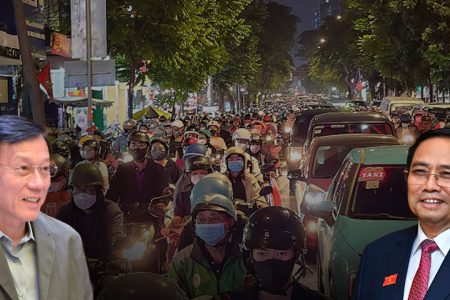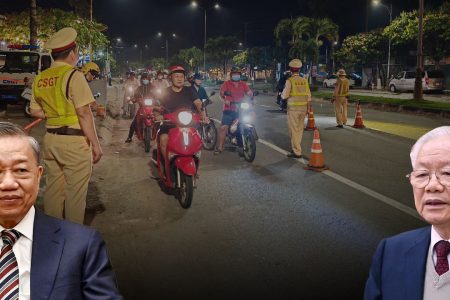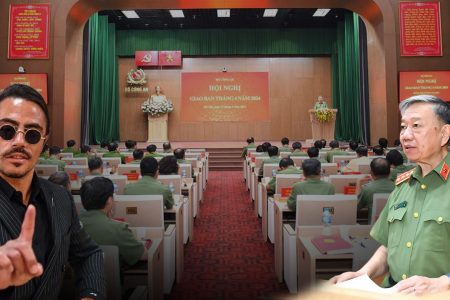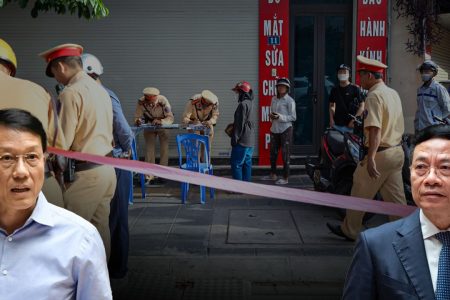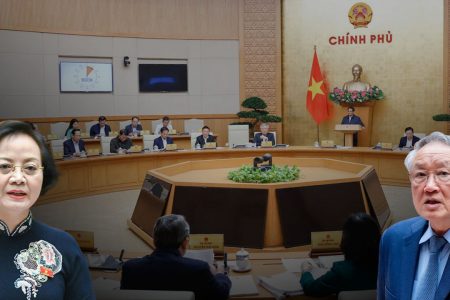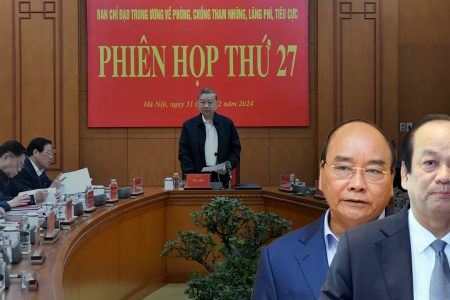
Minister of Natural Resources and Environment Mr. Tran Hong Ha, at a questioning session in the National Assembly on November 9, said that pollution is a common situation with the main cause of 60 to 90% of untreated wastewater which is discharge directly into the environment.
The State of Vietnam has invested more than VND20 trillion ($851 million) in environmental monitoring stations in Hanoi, Ha Nam, and Hoa Binh, Mr. Tran Hong Ha continued, but to thoroughly handle the problem lies in that how to control the volume of wastewater before being discharged into the environment.
According to Professor Dr. Tran Hieu Nhue, former Director of the Institute of Water and Environmental Technologies, it is even more difficult without a monitoring mechanism that concretizes the controlling role of the community:
“Garbage and wastewater are generally economic, social, and environmental issues. It covers a wide range of stakeholders from different subjects. Everyone must join hands. It’s easy to say but difficult to do. The government must have some monitoring mechanism and build the role of the community. For example, only local residents know the sewer drains underground water, but they don’t know to whom they would report.”
“If there is an Environmental Protection Law, people must participate. How the process is, who does, who monitors, who analyzes. It is clear that the material and human resources for monitoring and monitoring are still lacking a lot.”
According to the statement of the Minister of Natural Resources and Environment before the National Assembly, Da Nang, Quang Nam, Thanh Hoa, and Binh Dinh are at the forefront of revoking the delayed wastewater treatment projects, and at the same time negotiate with investors for people to access the sea.

Dr. Nguyen Thi Kim Oanh, Department of Hydrometeorology, University of Ukraine, once taught at Hanoi Natural University for 10 years, is now a full-time Professor at AIT Asian Institute of Technology in Thailand, said that the domestic waste in Vietnam has not been properly treated with the following principles:
“Like in Hanoi, there are some factories that have not yet been able to treat the domestic wastewater discharged into the To Lich River. The South region also has several factories. The collection for treatment is also a big problem, and then the treatment is effective. Although there is a factory, it must collect enough water to put it there. Methods are available but must be more synchronous, must be more drastic.”
“Even in Thailand, it’s the same, they do a little better than us. For example, in Ho Chi Minh city, Nhieu Loc canal is much better now. To Lich River in Hanoi is now a problem. Handling To Lich River, Hanoi’s landscape will be very different because there is a whole beautiful river in the city.”
But wastewater treatment technology is an expensive process, requiring facilities and high expertise, Dr. Nguyen Thi Kim Oanh explained:
“Depending on the technique you choose to treat, it is possible that the activated sludge deposition method, then take the upper part to aerate the microorganisms to grow to eat organic pollutants. When the sludge settles down, the clear water above it is discharged into the environment. Before being discharged into the environment, it is still necessary to measure whether to meet the emission criteria or not, the principle is like.”
“In our country, some factories still have not collected input wastewater regularly, sometimes too much, sometimes too little, the microorganisms we cultivate to process may not be effective. Literally, the processing must be more synchronized.”
It is about treating domestic wastewater, what about industrial wastewater, still Professor Kim Oanh:
“Industrial wastewater is in principle treated, but many factories have gone underground without treating. People complained of stench, came to see the whole river died because the factory did not treat or handle the standard. Enterprises need to be self-aware or have to have 100% automatic monitoring. In Vietnam, there are many small factories that cannot be equipped with 100% monitoring.”
“Actually, the country has quota, policy and all things have and even invested, but the implementation is not effective. Self-consciousness is very important, a set of education, legislation, policy, and funding. Handling must be drastic.”

The main cause of the alarming situation, 90% of all kinds of wastewater discharged directly to the environment without any treatment, is the lack of vision for urban and rural residential development planning,” commented Dr. Dang Hung Vo, former deputy minister of Natural Resources and Environment:
“In most rural residential areas, sewers for wastewater drainage have been built instead of in the past, the discharge is larger but still has to be discharged into lakes and lagoons, ponds, lakes, ditches, rivers … For urban centers, the housing development project investors are only interested in the floor area for sale, the drainage system is only enough to drain into the common sewer system, but the common sewer system is not large enough, pouring directly into the urban river system. Up to now, the common sewer has not escaped in time, causing flooding of urban roads.”
As a result, nearly every urban river is dead or in a dazed state waiting to die, said Dr. Dang Hung Vo. Reconstructing the entire urban drainage system after a long period of not paying attention to environmental protection is almost impossible:
“Impossible both in terms of funding and technical solutions. Hanoi now has nearly 10 million people, including unofficial migrants. This figure of Ho Chi Minh City must be 15 million, while the drainage system is still from nearly 100 years ago when only two to three million people in each place. The development expanded so much but the drainage system remained unchanged. Leaders of different places also question to find solutions, experiment, but they quit unfinished, almost just to have a job and spend money. I believe that in their real mindset is to wait for modern technologies so they not have to renovate and expand the domestic drainage system.”
For industrial clusters and craft villages, the story of direct wastewater discharge into the environment relates to the responsibility of the production investors. According to Dr. Dang Hung Vo, businesses do not want to spend the cost to build wastewater treatment plants because they want to use that money as profit:
“This is an act of environmental corruption, with taking funds for environment fees for their own. Even the investors in urban housing development projects do not pay for changes to the urban drainage system. Besides, the city governments also do not focus on thoroughly solving the problem of domestic wastewater treatment.”
Irresponsible investment and irresponsible management make people affected by the current heavily polluted environment, former Deputy Minister of Natural Resources and Environment Dang Hung Vo concluded.
RFA called the Hanoi Department of Natural Resources and Environment to ask about measures to deal with direct discharge of domestic wastewater into the environment. The answer from the Department of Natural Resources and Environment was not to respond to the foreign press.
A resident who did not want to name in Dong Nai suggests that now they can report their related problem on VTV’s program “Alo Good Morning.” This is the best way to widen residual comment on the issue of environmental pollution, this resident confirmed.
Thoibao.de (Translated)







